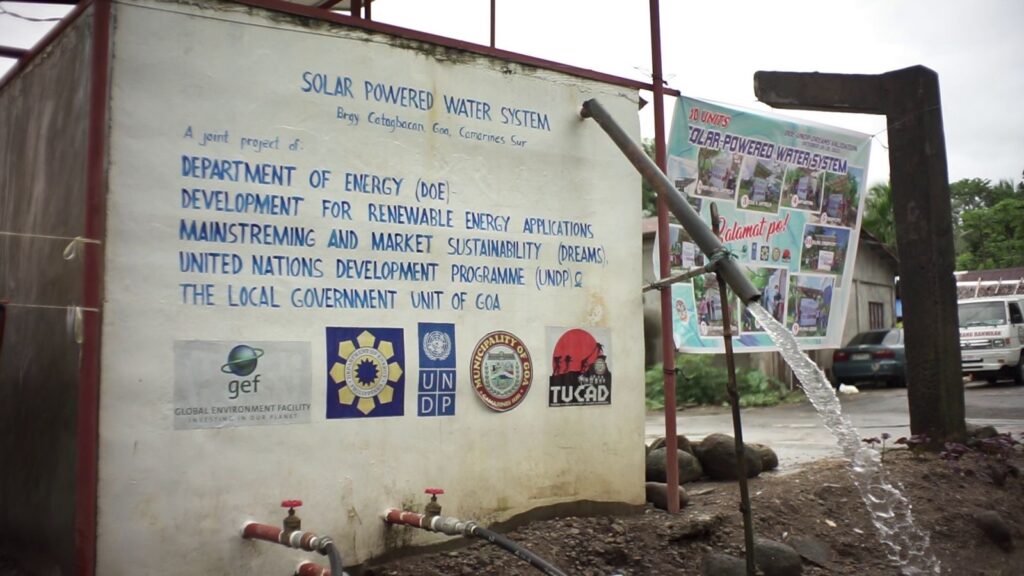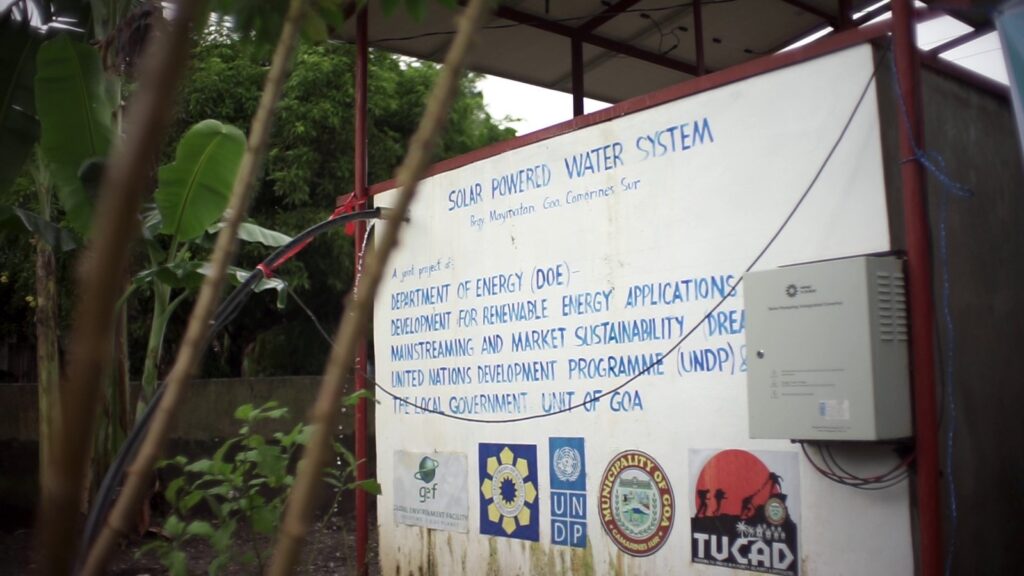While solar energy is mostly regarded as a power supply, it is now also powering up deep-well systems in the rural communities of Goa, Camarines Sur giving residents access to clean and safe water.
The Municipal Government of Goa, with support from the Department of Energy (DOE) in collaboration with the Global Environment Facility (GEF) and the United Nations Development Programme (UNDP), has completed the installation of solar-powered potable water systems in 10 water-deprived upland barangays.
About 820 families in Barangay Cagaycay, Catagbacan, Halawig-gogon, Matacla, Maymatan, Napawon, Salog, and Tabgon, now have access to running water from 192 tap stands.


This initiative is funded through the Development for Renewable Energy Applications Mainstreaming and Market Sustainability (DREAMS) Project via the Support Facility for Renewable Energy (SF4RE). DREAMS is enhancing local renewable energy (RE) investments by accelerating the deployment of RE systems and supporting local capability to innovate, create, operate, and maintain RE facilities. The implementation of the project also aims to expand RE shares in the country and demonstrate non-power applications of RE.
Through investments in off-grid and rural RE systems, local government units are encouraged to integrate RE into their own plans and policies.
The DOE and the Department of Interior and Local Government (DILG) issued JC 2020-01 to accelerate the execution of RE plans, policies, and mechanisms at the barangay, municipal, city, and provincial levels.
This policy mandates local government units, through their respective Energy Sector Committees, to identify RE resources within their areas of jurisdiction, incorporate RE into their comprehensive development plans, and streamline permit issuance processes for RE projects.
Solar power for running water
Residents of Goa mostly begin their days before sunrise to fetch enough water to cook, clean, wash, irrigate, and care for their livestock.
“Number one problem dito sa barangay namin noon ang tubig. Nahihirapan sila sa paglalaba, paglilinis ng banyo at iba pa, (Our number one problem in the barangay is the [lack of] water system. The households struggle in doing laundry, cleaning bathrooms, etc.,)” said Jose Peña, captain of Barangay Catagbacan.
The solar-powered water system is one of the community interventions implemented by the municipal government of Goa to help improve the quality of life of its constituents, especially women and children.
“Halimbawa sa mga bata, nahihirapan pumasok sa eskwelahan kasi kailangan maaga sila maligo. Ang mgananay, hindi nakakapagtrabaho dahil magsasalok ng tubig, nauubos yung oras nila, kaya hindi sila nagkakaroon ng maayos na trabaho (For instance, children find it hard to go to school because they need water to take a bath early in the morning. Mothers are unable to work and have gainful employment because fetching water takes up all of their time),” shared Goa Mayor Marcel Pan.
When the water system was installed, the heavy burden of daily tasks was lifted from the residents. “Nagagamit na namin ang oras na pinang iigib namin ng tubig dati sa ibang bagay o gawain, (We now have more time to devote to other activities),” said Juliet Cariño, a housewife and hog raiser from Barangay Catagbacan.
Two public schools also benefit from the solar PV powered water systems installed, providing children with access to clean water for better health and sanitation.
“Yung mga bata kung saan-saan pumupunta—sa labas, kung saang bahay-bahay diyan may gripo, dun sila umiigib. Yung mga banyo hindi malinisan kasi walang tubig, (Children had to go to outside or visit houses with taps nearby to fetch water. We were unable to clean our restrooms because we did not have water,” said Gil Vivo, the principal of Cagaycay Elementary School.
“Ngayon malinis na ang mga banyo namin. Yung mga bata, madali na din sila nakakapaghugas ng kamay. Yung WinS project ng Department of Education, nakaka comply na kami sa requirements, (We can now clean our restrooms; children can now wash their hands. We are also able to comply with the Department of Education’s WinS [WASH in Schools] project),” Vivo added.
The shift to inclusive and sustainable energy systems with innovative solutions is now making access to basic utilities for vulnerable communities a reality.
With the energy sector now a top focus for the Marcos administration, the DOE continuously pursues to accelerate the utilization of RE resources in power generation, as well as welfare and income-enhancing activities. The National Renewable Energy Plan (NREP) 2020-2040 aims to increase the country’s RE share to at least 35% of the power generation mix by 2030 and to 50% by 2040.
“Investments in off-grid and rural RE systems are key contributors to the realization of NREP 2020-2040 goals. These projects showcase the importance of investing in RE for communities in the Philippines. This is especially true in off-grid and rural communities because RE can be the answer to problems of electrification, and even other social welfare issues like water and health.” said Tea Jalin Ty, project monitoring and evaluation officer for the DREAMS project. I via UNDP
